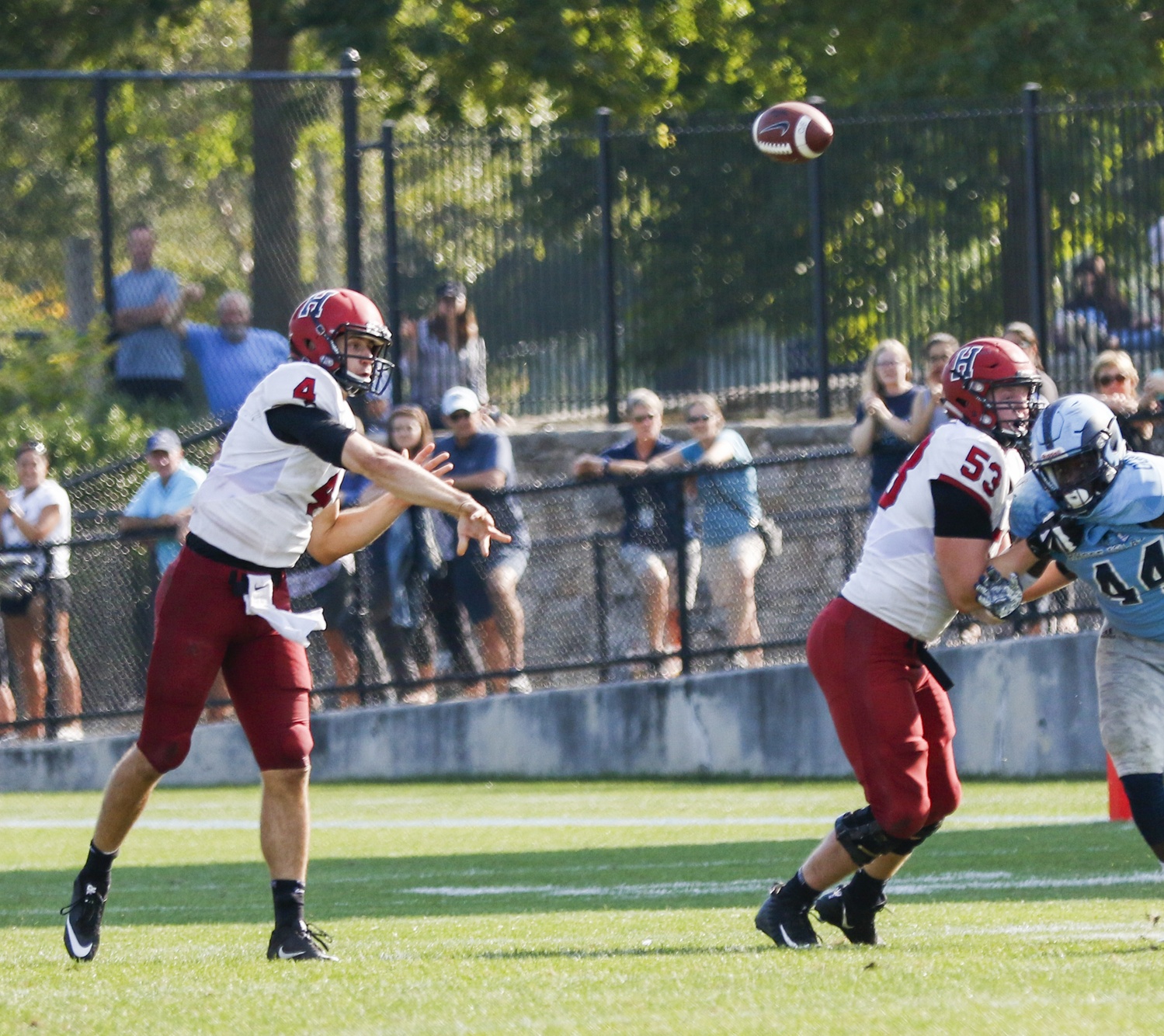
News
Summers Will Not Finish Semester of Teaching as Harvard Investigates Epstein Ties

News
Harvard College Students Report Favoring Divestment from Israel in HUA Survey

News
‘He Should Resign’: Harvard Undergrads Take Hard Line Against Summers Over Epstein Scandal

News
Harvard To Launch New Investigation Into Epstein’s Ties to Summers, Other University Affiliates

News
Harvard Students To Vote on Divestment From Israel in Inaugural HUA Election Survey
Viviano Stays on Top in Crimson Quarterback Battle

That’s more like it.
A week after a stunning loss in Rhode Island, Harvard rallied to stomp Brown, 38-2, through the first three quarters of the Ivy League opener. A one-man wrecking crew by the name of T.J. Linta was the sole reason the Bears managed a respectable final score of 45-28. The junior backup quarterback guided the Bears downfield five times in the fourth quarter, throwing for three touchdowns and taking one to the house on his own.
However, it was another veteran field general who came off the bench who will provide some comfort to Harvard’s team and its fans alike heading into Week 3. Joe Viviano, shaking off the rust from his disappointing season debut, completed 11 out of 13 passes for 150 yards after spelling freshman Jake Smith in the second quarter.
Benching a veteran for a rookie realistically has one of two outcomes: either the veteran is motivated to improve and show that he belongs when he gets his next chance to take the field, or he resents his younger competitor and becomes a problem. It is safe to say that Viviano falls under the first category.
Occasionally, however, players who unexpectedly find themselves on the bench do not always fully rebound.
As a Massachusetts native, I naturally gravitated toward the New England Patriots as my football team of choice. Though I was too young to remember it, a young Tom Brady shouldered the 2001-2002 team and delivered a Super Bowl victory. Brady started the season as the understudy to eight-year veteran Drew Bledsoe, but after the Patriots started 0-2 and Bledsoe was injured, Brady led the team the rest of the way.
Bledsoe, of course, did not have a future with the Patriots given Brady’s immediate success. However, the pro-bowler went on to play five more solid seasons in the NFL with the Bills and the Cowboys.
Bledsoe is perhaps football’s version of Wally Pipp. According to baseball lore, Pipp, a Yankees first baseman in the 1920s, asked to sit one game due to a headache. In his stead was a young Lou Gehrig. I’m guessing you can figure out how that story ends for Gehrig and the Bronx Bombers. As for Pipp, all that was left in store were three more relatively anonymous seasons with the Cincinnati Reds.
Allen Iverson is another storied athlete who was famously benched, though his substitution was not motivated by poor performances, and he continued to dominate the NBA after he was reinstated to the starting five. In 2004 Iverson, who was coming off an injury, was told he would be available off the bench to avoid a large workload in his first game. Thus was born his infamous “come off the bench” rant which sports fans continue to reference to this day.
Luckily for Harvard, Viviano proved last Saturday that he was no Drew Bledsoe, Wally Pipp, or Allen Iverson, giving Murphy and his coaching staff some clarity as the Crimson heads down to Washington, D.C., to take on Georgetown this Saturday.
Viviano’s tough start to the 2017 season in Kingston, R.I., mimicked the team’s performance as a whole. Though on the surface one game appears to be too small a sample size to accurately evaluate anything, in a ten-game season it is monumental.
For example, in the marathon that is the Major League Baseball season, slow starts are easily reversed. Look no further than this year’s Cleveland Indians. On August 23, the Tribe sat at 69-56 after two consecutive losses to the Red Sox, and they were still fighting off the Twins and Royals for the AL Central division lead. A season removed from losing the World Series in seven games, expectations were certainly higher in The Rock and Roll Capital of the World.
The Indians responded by rattling off 22 consecutive wins, the most consecutive victories in Major League history. Now, Cleveland has clinched its division with October on the horizon.
In the sprint that is a football season, however, slow starts can doom a team. According to ESPN, only 12 percent of NFL teams to start 0-2 since 1990 have made the playoffs.
With six fewer games to work with in the Ivy League—technically nine fewer, as non-league contests do not count for championship standings—each game matters that much more. And Viviano and the rest of the Crimson delivered in their first real test against Brown.
Coach Tim Murphy has a reputation as a great football mind, and the timing of his quarterback switches looks like yet another brilliant sequence of moves. He made the tough call to sit a senior in the first quarter of an important Ivy League game, and he gave the veteran signal caller a chance to prove himself in that very game, all the while getting a preview of Jake Smith in a game situation.
Though one day Smith may end up as the Tom Brady to Murphy’s Bill Belichick, for now it is still Joe Viviano’s squad to lead.
—Staff writer Jack Stockless can be reached at jack.stockless@thecrimson.com.
Want to keep up with breaking news? Subscribe to our email newsletter.
